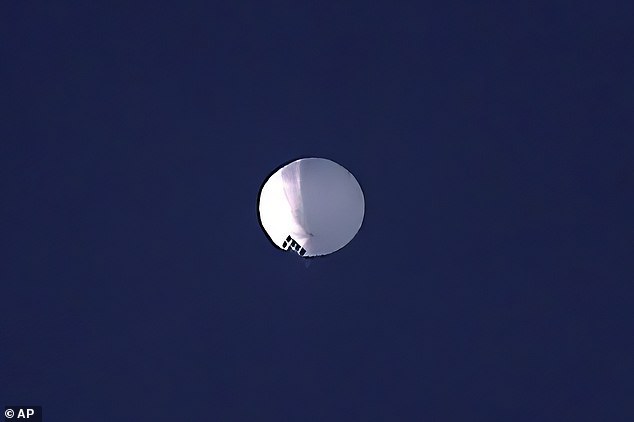NORAD general launches investigation into on-base drinking after busting secret ‘John Wayne Saloon’ operating in a classified workspace
The top general overseeing the North American Aerospace Defense Command (NORAD) and the US Northern Command (NORTHCOM) has launched an investigation into allegations of workplace alcohol use after discovering alcohol containers in secret work areas.
The probe follows questions out USA todaywhich reported Wednesday that a secret day-drinking tavern known as the “John Wayne Saloon” had been operating at NORAD and NORTHCOM headquarters at the Peterson Space Force Base in Colorado.
A spokesperson for the command confirmed the investigation in a statement to DailyMail.com, saying NORAD and NORTHCOM Commander Gen. Glen VanHerck “takes these allegations seriously.”
“NORAD and U.S. Northern Command are aware of reports of allegations of conduct at command headquarters,” the spokesperson said, adding that VanHerck had initiated “an investigation into alleged conduct and command culture” when he learned of the allegations .
“There are no indications of any impact to operations, and NORAD and USNORTHCOM continue to conduct our missions,” the spokesperson added.
NORAD has been under close scrutiny since an incident in January in which a Chinese spy balloon entered U.S. airspace and hovered over sensitive military installations.
General Glen VanHerck (above) has launched an investigation into allegations of workplace alcohol use after discovering alcohol containers in secret work areas
VanHerck also confirmed the investigation CBS News earlier on Wednesday he said he launched the investigation after finding “a relatively small number” of beer and liquor containers in “a secret work area behind a combination lock.”
The general told USA Today that he led the walk-through inspection after the newspaper inquired about the allegations last week.
“Based on your investigation, I immediately conducted a walkthrough of all areas in the command with the intent of confirming the allegations,” VanHerck told the outlet.
“We found John Wayne’s poster outside a door. Behind the closed door we found an office space with a refrigerator that contained some alcohol. We did find some beer… some liquor.”
Citing sources, USA Today reported that the room was located in Building 2, secured with a keypad lock, and contained about half a dozen bottles of liquor.
The “saloon” was named after a poster of actor John Wayne taped to the door and no cell phones were allowed inside, the sources said.
VanHerck told CBS that, according to his preliminary assessment, workplace drinking was not a widespread problem among his commands, and he did not believe it had an impact on their mission to defend North America, including the spy balloon incident.
“I don’t think there has been any impact on our recent operations, including the high-altitude balloon,” he told CBS.
“In fact, I’m very confident and comfortable from a preparedness perspective of where we are right now, but I do look forward to the investigation to see what actions may need to be taken,” the general added to.
NORAD and NORTHCOM are both headquartered at Peterson Space Force Base in Colorado, but it was not immediately clear whether VanHerck discovered the illegal liquor containers at that facility.
NORAD is charged with monitoring and defending airspace in Canada and the continental US, while NORTHCOM protects US territory and national interests in much of North America.
The general said that while alcohol is not completely banned in work areas, there are approval procedures that limit where and when alcohol can be consumed.
VanHerck said he was not aware of allegations that illegal alcohol use in the workplace would be elevated to command personnel.
“I’ve been here since August 2020 and all I can tell you is that no one has come to me and expressed concern about the consumption of alcohol in the workplace,” he told CBS.
“We have conducted several climate surveys and I cannot recall any direct, specific allegations or concerns about alcohol in the workplace.”

NORAD and NORTHCOM have been under close scrutiny since a January incident in which a Chinese spy balloon (above) invaded U.S. airspace and hovered over military installations
After the spy balloon incident last January, NORAD has been working to expand its early detection capabilities.
Last month, Defense One reported that the Pentagon plans to build six new radar facilities in the northwestern US and Canada to detect hypersonic Russian low-flying cruise missiles.
The new over-the-horizon northern radars will be designed for early detection if Moscow decides to send such missiles over the Arctic.
Four large plots of land are being purchased by the US Air Force in the US and two in Canada for radar systems.
Earlier this year, NORAD Commander VanHerck told Congress about the urgent need for such an over-the-horizon radar to protect against emerging threats of cruise missiles and hypersonic weapons from Russia.
He said it would deliver “proven, affordable technology that will ensure our ability to detect threats from surface to space as we approach North America.”
He said: “Rather than deploying the capabilities in eight to 10 years, maybe we can shorten that to four to five years. And by the way, I want Canada to do the same. Deploying a capacity ten years from now is not where we need to be.”
VenHerck said Alaska may be the “most strategic location on Earth,” in part because it is the “shortest path for ballistic missiles from Russia, possibly China and (North Korea) to our homeland.”
“The bottom line is that if you can’t detect something, you can’t defeat it, and you certainly can’t deter it.”
